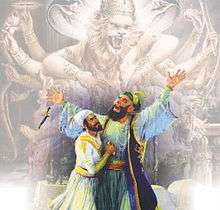Powada

The Powada (Marathi: पोवाडा) is a genre of Marathi poetry that emerged during the late 17th century in India. The powadas are a kind of ballad written in an exciting style and narrate historical events in an inspiring manner. The composer-cum-singers of the powadas are known as Shahirs. The early powadas are mostly composed by the eyewitnesses of the great events celebrated in these ballads.
The professional powada singers later formed a guild or caste known as the Gondhalis. The earliest notable powada was the Afzal Khanacha Vadh (The Killing of Afzal Khan) (1659) by Agnidas, which recorded Shivaji's encounter with Afzal Khan. The next notable powada was the Tanaji Malusare by Tulsidas, which gave an account of the capture of Sinhagad fort by Tanaji.[1] Another notable contemporary powada was the Baji Pasalkar by Yamaji Bhaskar.
During the Peshwa rule, several celebrated Shahir poet-singers, which include Ram Joshi (1762–1812), Anant Phandi (1744–1819), Honaji Bala (1754–1844) and Prabhakar (1769–1843) composed a number of powadas.
About sixty powadas were collected by Harry Arbuthnot Acworth and S. T. Shaligram and published under the title, Itihas Prasiddha Purushanche Va Striyanche Powade in 1891. Out of these, ten powadas were translated into English verse by H. A. Acworth and published as Ballads of the Marathas in 1894.[2]
In the Marathi movie, Me Shivajiraje Bhosale Boltoy (2009), the powada, Afzal Khanacha Vadh is played.
Mahatma Jyotirao Phule discovered the 'samadhi' of Chhatrapati Shivaji Maharaj, and celebrated Shivaji Maharaj-Jayanti in 1869 in Pune for the first time. Phule repaired the samadhi and a wrote his first book.-- a Ballad (Powada) on Shivaji, which is noted in British records.
References
- ↑ Majumdar, R.C. (ed.) (2007). The Mughul Empire, Mumbai: Bharatiya Vidya Bhavan, ISBN 81-7276-407-1, p.584
- ↑ Gupta, Manik Lal (1989). Sources of Mughal History. New Delhi: Atlantic. p. 89. ISBN 81-7156-125-X.
- H. A. Acworth and S. T. Shaligramgot the powada of afazaj vadha written by aagindas in kolhapur shivshahir purshottam raut